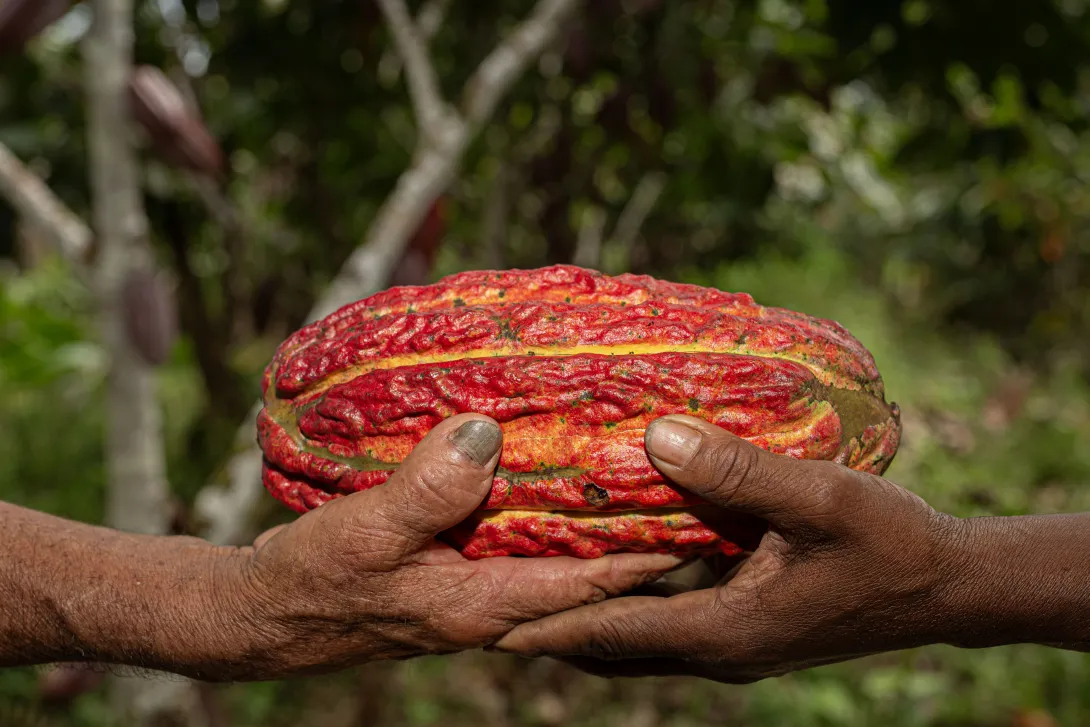Share the page
Our role

Created in 1994 by the French government following the first Earth Summit, the FFEM has already supported more than 400 projects in over 120 countries, two-thirds of them in Africa and the Mediterranean.
The FFEM works in partnership with public, private and civil society players in the South and the North, as well as with other donors and international organisations. The projects it finances generate local environmental, social and economic benefits. They help to preserve biodiversity, the climate, international waters, land and the ozone layer, and combat pollution.
The particularity of the FFEM is that it focuses on pilot projects in order to learn from them and disseminate their innovations on a larger scale.
This interministerial financial instrument is at the service of France's cooperation and official development assistance policy. It occupies a unique position among bilateral international donors. It stands out from other public and even private initiatives by placing innovation at the heart of its work.
Our Mission
For the past 30 years, the FFEM has been encouraging innovative initiatives and pilot projects that address global environmental issues and deliver environmental, social and economic benefits.
Its aim is to test solutions and learn from them so that they can be disseminated and deployed in other locations and/or on a larger scale. These are the specific features of the FFEM and its distinctive character: innovation and the reproducibility of its actions.
The FFEM's mandate is to support innovation to preserve the global environment and promote local development in developing countries.
The FFEM's actions are in line with the guidelines set by the French government and reiterated by the Interministerial Committee for International Cooperation and Development (CICID), in terms of the environment and development, and also contribute to achieving the Sustainable Development Goals (SDGs) adopted by the United Nations in 2015.
The projects supported by the FFEM contribute simultaneously to the challenges of several major international environmental conventions. The FFEM's mandate covers :
- combating climate change and its adverse effects, with particular reference to the United Nations Framework Convention on Climate Change;
- the preservation and sustainable management of biodiversity and natural resources, with particular reference to the Convention on Biological Diversity;
- combating desertification and land degradation, including deforestation, in particular in the context of the United Nations Convention to Combat Desertification;
- the protection of international inland and marine waters within the framework of multilateral conventions on international waters and transboundary basins;
- the fight against chemical pollutants and waste management, in particular within the framework of the Stockholm Convention on Persistent Organic Pollutants and the Minamata Convention on Mercury;
- the elimination of substances that deplete the stratospheric ozone layer, under the Montreal Protocol.
In line with its multilateral counterpart, the Global Environment Facility (GEF), the FFEM finances initiatives that help developing countries achieve the objectives of these conventions.
Find out more about international agreements at the end of this page in the "Focus on international agreements" section.
Multi-stakeholder partnerships are fundamental to the identity and actions of the FFEM. They involve players from the North and South, as well as the public sector, the private sector, civil society, local authorities, research and other donors. The FFEM's sectoral strategies and the projects it finances are developed in collaboration with the players concerned by its priority themes.
All of the FFEM's actions aim to :
- Supporting grassroots projects, on a regional or subsector scale
- Encouraging innovative initiatives with environmental, social and economic co-benefits
- Promoting action and the sharing of experience
- Mobilising multi-stakeholder partnerships
- Facilitating consultation and shared governance
To achieves these objectives, the FFEM is working to consolidate its partnership approach by :
- Engaging private sector players
- Supporting civil society initiatives
- Mobilising local authorities
- Developing links with research
- Strengthening partnerships with other donors
The FFEM places innovation at the heart of its work. The scientific community has shown that the environmental crisis is due to our lifestyles. But if we are to change our lifestyles, we need to be able to propose alternatives. That's where the FFEM comes in, by supporting projects that innovate, test sustainable solutions and pave the way for far-reaching change.
In addition to their environmental impact, the innovations supported by the FFEM also serve socio-economic development and the well-being of local populations.. Proposing convincing alternative solutions is the only way to ensure that they are sustainable, that they can be scaled up, and therefore that they have a real impact on the environment.
These innovations may be organisational, economic, methodological or technical. They are sometimes multiple within the same project, to better respond to the complex challenges of the territories and societies in which they are embedded.
For the FFEM, the innovative nature of a project can only be assessed on the basis of a specific diagnosis of the project and/or the region, depending on the given geographical, socio-economic, political, institutional and ecological context, and the innovative way in which the project intends to trigger change in favour of the environment and sustainable development.

Our strategic priorities
In order to finance projects that reconcile protection of the global environment and economic growth in the countries where it operates, the FFEM has historically concentrated its efforts in the areas of climate, biodiversity, international waters, land degradation, chemical pollutants and the ozone layer.
For the period 2023-2026, the FFEM is focusing its action on five priority themes, which are in line with previous strategies, while identifying new niches for innovation:
- Conservation and enhancement of biodiversity
- Resilience of aquatic ecosystems
- Sustainable management of agriculture and forestry
- Adaptation and low-carbon transition of cities and regions
- Circular solutions and the fight against pollution
The aim of these themes is to give priority to the most relevant projects and to capitalise on their experience. They are not mutually exclusive; the FFEM encourages projects that are likely to generate cross-benefits. Whatever the theme, the FFEM also pays particular attention to innovation methods, such as :
- Nature-based solutions and the One Health approach
- Knowledge and know-how
- Citizen participation
- Mechanisms for mobilising sustainable financial resources
- Research in support of public policy
Download our 2023-2026 strategy paper
Focus on the SDGs
In 2015, all the countries of the world agreed on 17 Sustainable Development Goals (SDGs) to end poverty, fight inequality and injustice, tackle climate change and build a shared world by 2030. Adopted on 25 September 2015 at the United Nations General Assembly in New York, the SDGs are the successor to the eight Millennium Development Goals (MDGs).
What's new about the SDGs? They are universal, mutually dependent goals that apply just as much to the United States as they do to Peru or Chad. This vision, shared by the whole planet, of the direction to take over the next 15 years is promising. The Sustainable Development Goals call for the mobilisation of everyone: the international community, governments, NGOs, local authorities, businesses and citizens.
The FFEM's action contributes to the achievement of these SDGs.
Focus on international conventions
The international community has adopted a number of major environmental conventions in response to the global challenges of climate change, the erosion of biodiversity, the degradation of the oceans and pollution. These conventions form an essential foundation for coherent and ambitious global environmental governance.
-
The United Nations Framework Convention on Climate Change (UNFCCC), adopted in 1992, is the cornerstone of international action on climate change. It has given rise to major agreements such as the Kyoto Protocol (1997) and the Paris Agreement (2015), which commit countries to reducing their greenhouse gas emissions and adapting to the impacts of climate change.
-
The Convention on Biological Diversity (CBD), also adopted in 1992, aims to preserve the diversity of living organisms, ensure the sustainable use of natural resources and guarantee an equitable sharing of the benefits arising from their use. In 2022, it led to the adoption of the Kunming-Montreal Global Biodiversity Framework, which sets ambitious targets for 2030.
-
Adopted in 1994 and entered into force in 1996, the United Nations Convention to Combat Desertification (UNCCD) is the main international instrument for preventing land degradation in arid, semi-arid and dry sub-humid areas. It aims to combat desertification, mitigate the effects of drought and promote sustainable land management.
-
The United Nations Convention to Combat Desertification (UNCCD) is based on an integrated approach, combining environmental, social and economic actions, and places particular emphasis on the most vulnerable populations, especially in developing countries. It encourages States Parties to develop national, regional and sub-regional action programmes. Combating desertification is also part of the Sustainable Development Goals (SDGs), in particular SDG 15, which aims to "preserve and restore terrestrial ecosystems".
- The United Nations Convention on the Law of the Sea (UNCLOS), adopted in 1982, provides a framework for the use of maritime spaces and marine resources. It establishes a global legal framework to govern the rights and duties of States in terms of navigation, resource management and protection of the marine environment. It was recently supplemented by the adoption of the International Treaty on the Protection of the High Seas (BBNJ) in 2023, designed to better preserve marine biodiversity beyond national jurisdictions.
In addition to the global framework of the UNCLOS, regional cooperation plays an essential role in the sustainable management of the seas and oceans. Regional conventions, such as the Barcelona Convention for the Mediterranean, the Abidjan Convention for the West African coast and the Nairobi Convention for the Western Indian Ocean, aim to strengthen the protection of marine environments in specific geographical contexts. These regional agreements make it possible to adapt the implementation of UNCLOS principles to local realities, by promoting cooperation between riparian countries and developing concrete action plans to combat marine pollution, protect coastal ecosystems and strengthen the resilience of coastal communities. -
The so-called BRS conventions - Basel, Rotterdam and Stockholm - are 3 complementary international treaties designed to protect human health and the environment against the harmful effects of chemical substances and hazardous waste.
- The Basel Convention (1989) governs the transboundary movement of hazardous waste and its disposal, in order to prevent its transfer to countries that do not have the capacity to manage it in an environmentally sound manner.
- The Rotterdam Convention (1998) establishes a Prior Informed Consent (PIC) procedure for certain hazardous chemicals and pesticides, in order to regulate international trade.
- The Stockholm Convention (2001) aims to eliminate or restrict the production, use and release of persistent organic pollutants (POPs), particularly harmful chemical substances that accumulate in living organisms and are dispersed over long distances.
Together, these conventions form an essential international legal basis for combating pollution and encouraging responsible management of chemicals and waste.
The FFEM's mandate falls within the framework of these major international conventions. Through its areas of intervention and field projects, it contributes to the concrete implementation of global commitments in the areas of climate, biodiversity, oceans and the fight against pollution. By supporting innovative and sustainable solutions, the FFEM acts in coherence with these multilateral frameworks to strengthen the environmental transition in developing countries.






